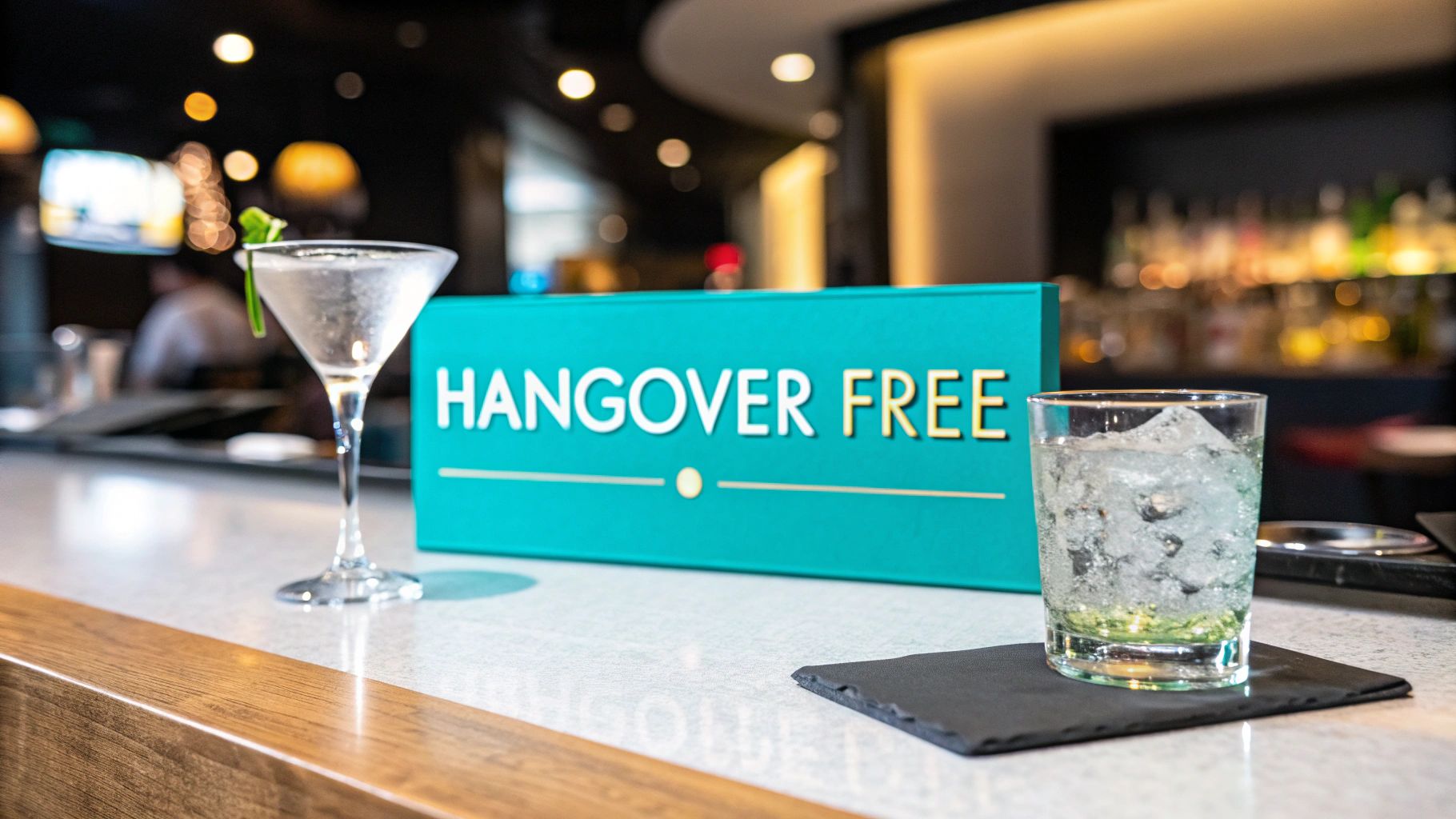

· By Annemarie
7 Hangover Prevention Tips for 2025
Waking Up Refreshed: Your Guide to a Hangover-Free Life
Hangovers can ruin your day. This listicle offers seven powerful hangover prevention tips to help you wake up feeling refreshed. Learn how strategic hydration, pre-drinking meals, smart beverage choices, pacing, supplements, staying active, and monitoring your drinks can minimize those dreaded hangover symptoms. These tips are effective on their own, and even more powerful when combined with a hangover helper. We'll empower you to take control and enjoy a brighter, hangover-free future. Let's dive into these effective hangover prevention tips.
1. Hydrate Strategically
Dehydration is a primary culprit behind those dreaded hangover symptoms. Alcohol acts as a diuretic, causing your body to flush out water and essential electrolytes faster than usual. This leads to that pounding headache, nausea, and overall feeling of malaise. Strategic hydration, one of the most effective hangover prevention tips, combats this by replenishing your body's fluids before, during, and after alcohol consumption. This simple yet powerful approach can significantly reduce the severity of your hangover or even prevent it altogether.
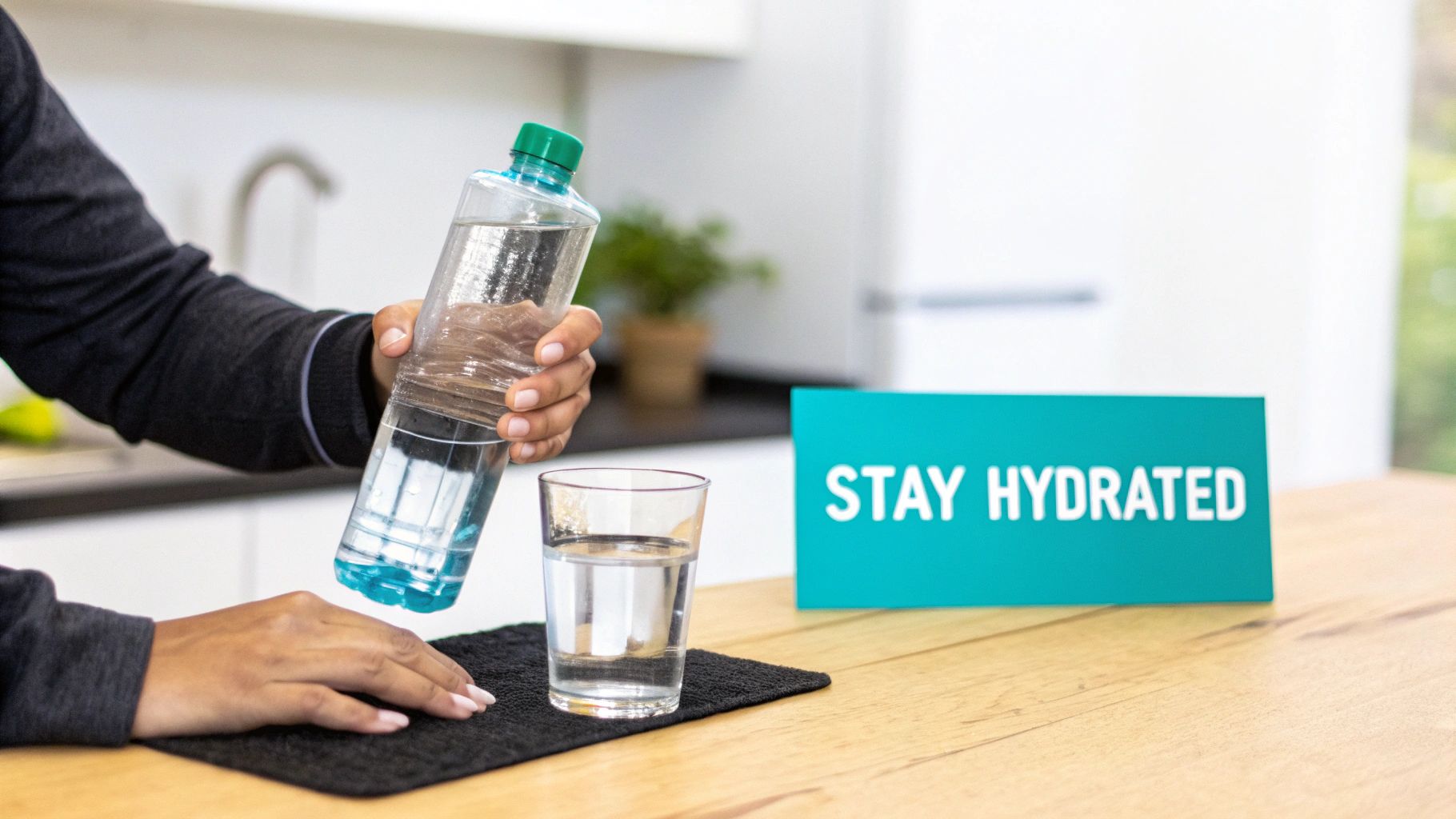
This method involves consciously integrating water consumption into your drinking routine. It's more than just having a glass of water before bed; it's about proactively replenishing fluids throughout the entire process. This includes pre-hydrating before your first sip of alcohol, alternating alcoholic beverages with water, and continuing to hydrate even after you've stopped drinking. This consistent approach helps maintain your body's fluid balance, mitigating the dehydrating effects of alcohol. For example, many athletes and health-conscious individuals follow the "1:1 rule," consuming one glass of water for every alcoholic beverage. Similarly, some high-end bars proactively serve water alongside alcoholic drinks, understanding the importance of hydration for their patrons' well-being. These real-world examples demonstrate the practicality and effectiveness of strategic hydration.
Actionable Tips for Strategic Hydration:
- Pre-hydrate: Drink a large glass of water (16-20oz) before your first alcoholic beverage. This establishes a strong hydration base.
- Alternate: Consume at least 8oz of water between each alcoholic drink. This consistent replenishment helps counteract the diuretic effects of alcohol in real-time.
- Rehydrate Before Bed: Drink another 16-20oz of water before going to sleep. This crucial step helps your body recover overnight.
- Electrolyte Boost: For more severe cases or prolonged drinking sessions, consider electrolyte tablets or sports drinks. These replenish essential minerals lost through dehydration. While some competitors may offer similar advice, remember that consistent and strategic hydration is key, a principle we emphasize.
Pros and Cons of Strategic Hydration:
Pros:
- Easy Implementation: This method requires no special equipment or complicated procedures.
- Cost-Effective: Water is readily available and inexpensive.
- Addresses a Root Cause: Directly combats dehydration, a primary cause of hangovers.
- Overall Health Benefit: Staying hydrated is beneficial for overall health, regardless of alcohol consumption.
Cons:
- Requires Discipline: Consciously incorporating hydration into your drinking routine requires planning and commitment.
- Increased Bathroom Visits: Frequent urination is a natural consequence of increased water intake.
- Not a Complete Solution: While highly effective, strategic hydration may not completely prevent hangovers, especially after heavy drinking.
Strategic hydration deserves its place on this list because it is a simple, accessible, and effective way to mitigate hangover symptoms. It addresses a core issue – dehydration – and is beneficial for your overall health. While other methods or products may offer quick fixes or claim superior results, often these are less scientifically supported. We focus on providing proven strategies that empower you to take control of your well-being. Learn more about Hydrate Strategically. This approach is particularly helpful for social drinkers, nightlife enthusiasts, health-conscious individuals, busy professionals, and frequent travelers who want to enjoy themselves responsibly and minimize the negative consequences of alcohol consumption.
2. Eat Before Drinking
One of the most effective hangover prevention tips is surprisingly simple: eat before you drink. Consuming a substantial meal before imbibing alcohol significantly slows its absorption into the bloodstream. This happens because food, especially foods rich in protein, healthy fats, and complex carbohydrates, creates a sort of protective lining in the stomach. This barrier slows the rate at which alcohol passes into the small intestine, where it's absorbed into the bloodstream. This, in turn, keeps blood alcohol concentrations (BAC) from rising too quickly, which is key to preventing a hangover.
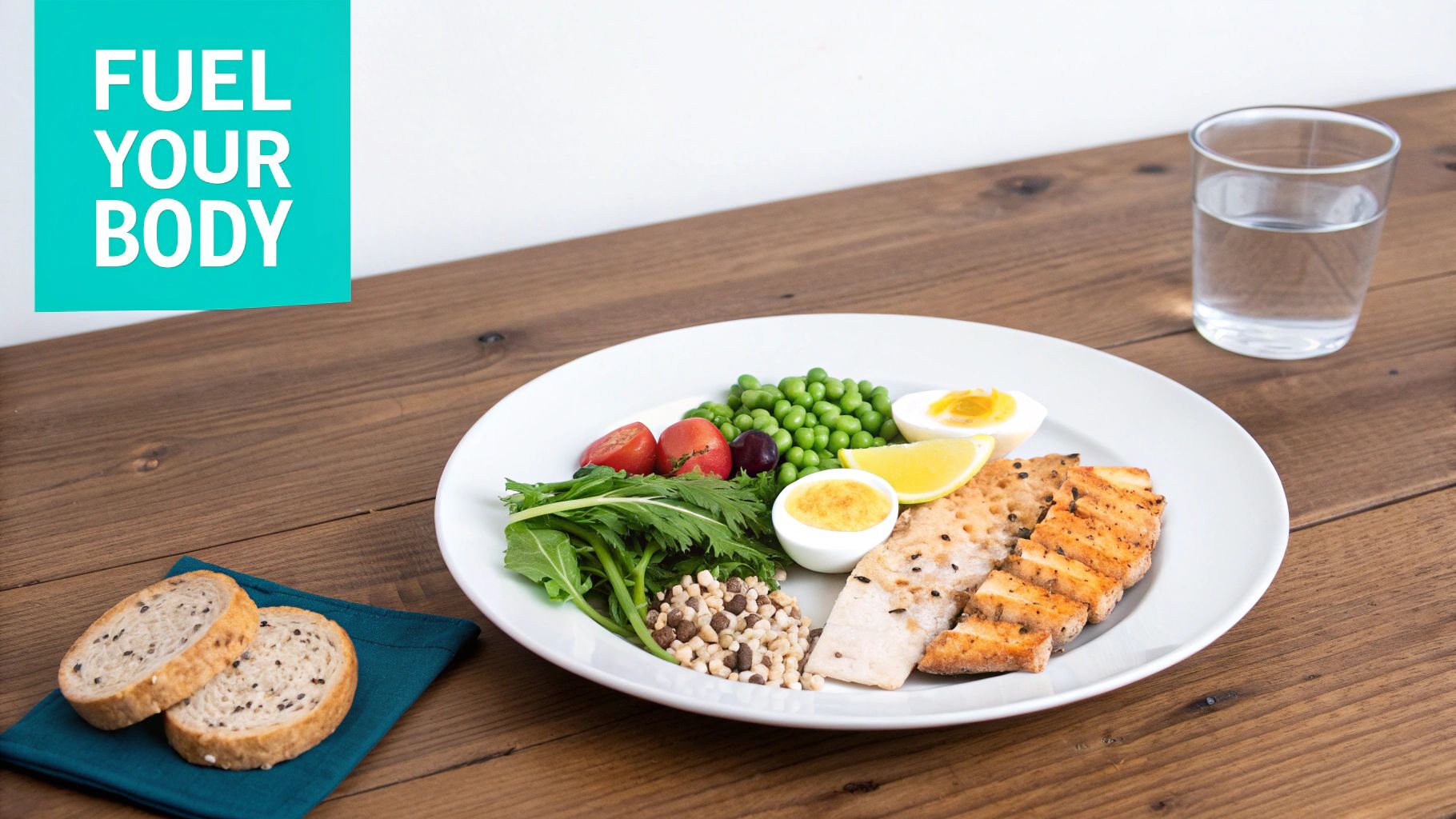
The timing of your pre-drinking meal matters. Ideally, aim to eat 1-2 hours before you start drinking. This gives your body enough time to digest the food and establish that protective barrier. The composition of the meal is also crucial. Focus on incorporating protein, healthy fats, and complex carbohydrates. Specific foods like avocado, olive oil, nuts, whole grains, eggs, lean meat, and yogurt have enhanced protective effects due to their nutrient density and ability to slow gastric emptying.
This practice has roots in several cultural traditions. For instance, Mediterranean cultures have long consumed olive oil before enjoying wine, and Korean drinking sessions often start or include substantial food. These traditions highlight the time-tested wisdom of lining the stomach before drinking.
Why this deserves a spot on the list: Eating before drinking offers numerous advantages. It slows the rate of alcohol absorption, reduces peak BAC, and may even reduce your overall alcohol consumption as you feel fuller. Additionally, a nutritious meal provides essential nutrients that support your body's alcohol metabolism process.
Pros:
- Slows alcohol absorption rate
- Reduces peak blood alcohol concentration
- May reduce overall consumption
- Provides nutrients that support alcohol metabolism
Cons:
- May create false confidence about drinking capacity
- Effectiveness varies by individual metabolism
- Not effective if eating occurs after drinking begins
Actionable Tips for Hangover Prevention:
- Consume a balanced meal 1-2 hours before drinking. Don't wait until you've already started drinking to eat.
- Include healthy fats like avocado, olive oil, or nuts.
- Choose complex carbs like whole grains, brown rice, or quinoa. Avoid simple sugars, as these can be counterproductive.
- Include protein sources such as eggs, lean meat, fish, or yogurt.
- Avoid drinking on an empty stomach at all costs. This is one of the surest ways to set yourself up for a hangover.
This approach is backed by nutritionists, gastroenterologists, and, as mentioned, is reflected in cultural drinking traditions in Mediterranean and Asian countries. While other companies or products might offer quick fixes, focusing on this fundamental nutritional strategy provides a solid foundation for responsible and enjoyable drinking. By eating a balanced meal before you drink, you take proactive steps towards preventing a hangover and prioritizing your well-being.
3. Choose Alcoholic Beverages Wisely
One of the most effective hangover prevention tips involves being discerning about your drink choices. Not all alcoholic beverages are created equal when it comes to hangover potential. This is largely due to congeners, which are toxic chemical by-products produced during fermentation. Darker alcohols like whiskey, rum, and red wine generally contain higher levels of these congeners than lighter-colored drinks like vodka, gin, and white wine. These congeners contribute significantly to the severity of hangover symptoms. Choosing your drinks strategically can make a big difference in how you feel the next day.
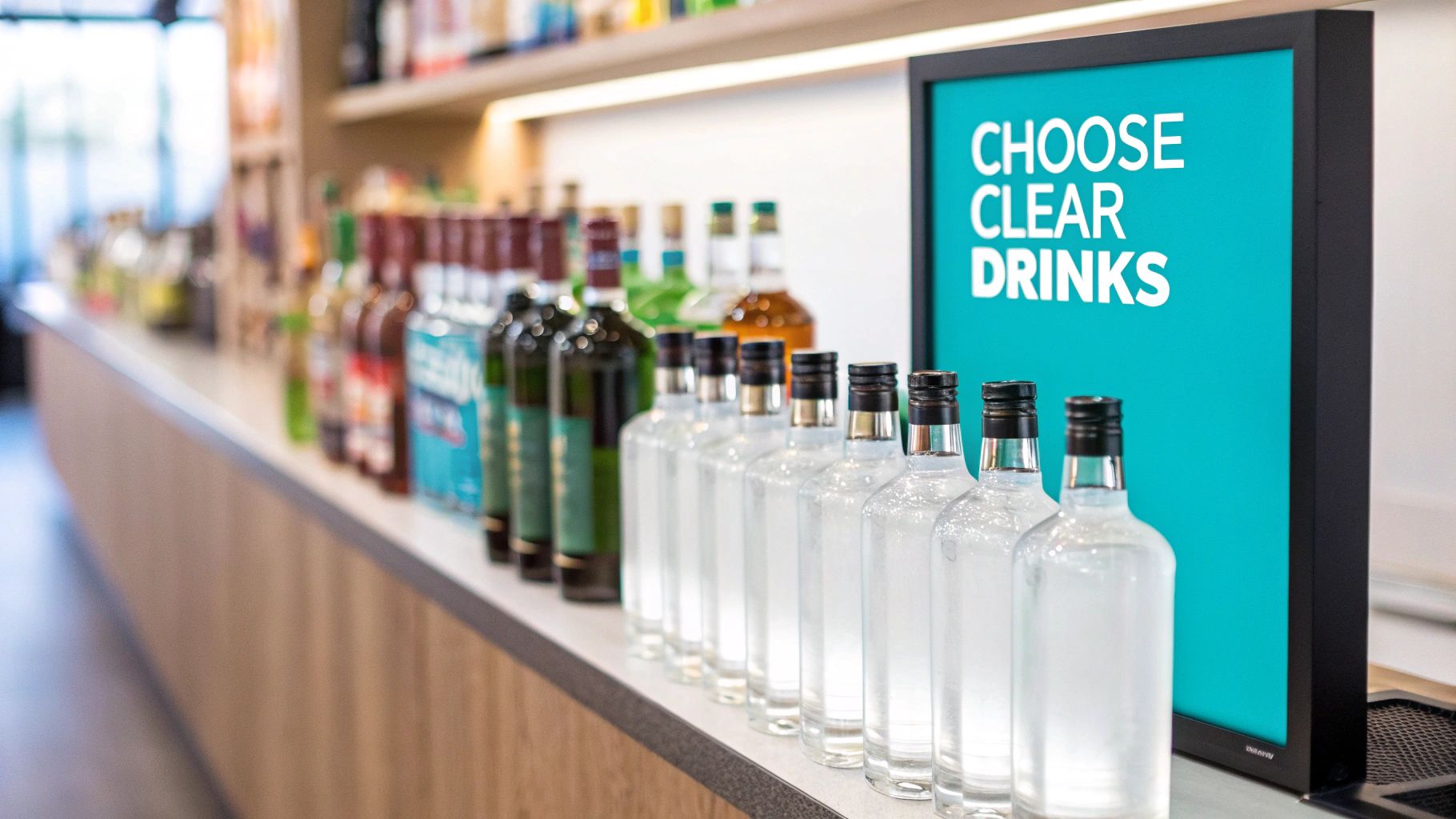
Beyond congeners, sugar content and carbonation also play a role. Sugary cocktails and liqueurs can exacerbate dehydration, a key factor in hangovers. Carbonation, on the other hand, increases the rate at which alcohol is absorbed into your bloodstream, leading to a quicker and more intense intoxication, potentially worsening hangover symptoms. This approach to hangover prevention is particularly valuable for social drinkers, nightlife enthusiasts, health-conscious individuals, busy professionals, and frequent travelers who want to enjoy social events without sacrificing the next day. By making informed choices, you can significantly reduce hangover symptoms while still enjoying a night out.
Examples of Successful Implementation:
- Opting for a vodka soda with lime instead of a rum and coke.
- Choosing a crisp Sauvignon Blanc over a full-bodied Cabernet Sauvignon.
- Enjoying a gin and tonic with a premium gin known for its filtration process.
Actionable Tips for Choosing Your Drinks:
- Choose vodka or gin: These clear spirits typically contain fewer congeners than whiskey, bourbon, or tequila.
- Select white wine instead of red wine: White wine generally has a lower congener content.
- Avoid champagne and carbonated alcohol mixers: Carbonation speeds up alcohol absorption.
- Skip sugary cocktails and sweet liqueurs: Sugar contributes to dehydration.
- Consider premium brands: Premium alcohol brands often utilize better filtration processes, potentially reducing congener content. While some competitor services may recommend specific brands, researching filtration processes yourself empowers you to make the best choices based on facts, not marketing.
Pros and Cons of Choosing Beverages Wisely:
Pros:
- Can significantly reduce hangover symptoms
- Still allows for social drinking
- Easier on liver processing
Cons:
- Limits beverage choices
- May still cause hangovers in sufficient quantities
- Individual sensitivity to specific alcohols varies
This method deserves a place on this list because it empowers you to take control of your drinking experience. By understanding the factors contributing to hangovers, you can make informed decisions that minimize their impact. Learn more about Choose Alcoholic Beverages Wisely. This proactive approach to hangover prevention is backed by bartenders, alcohol researchers, and mixologists like Jeffrey Morgenthaler who advocate for 'cleaner' drinking. While other services might offer generic advice, understanding the science behind congeners and alcohol absorption allows for a more tailored and effective approach to hangover prevention.
4. Pace Your Drinking
One of the most effective hangover prevention tips revolves around a simple but powerful concept: pacing your drinking. Your liver is your body's primary filtration system, and when it comes to alcohol, it can only process about one standard drink per hour. Consuming alcohol at a slower rate gives your body the necessary time to metabolize it properly, reducing the overall toxicity and preventing a rapid buildup of acetaldehyde. Acetaldehyde is a harmful byproduct of alcohol metabolism and a significant contributor to those dreaded hangover symptoms.
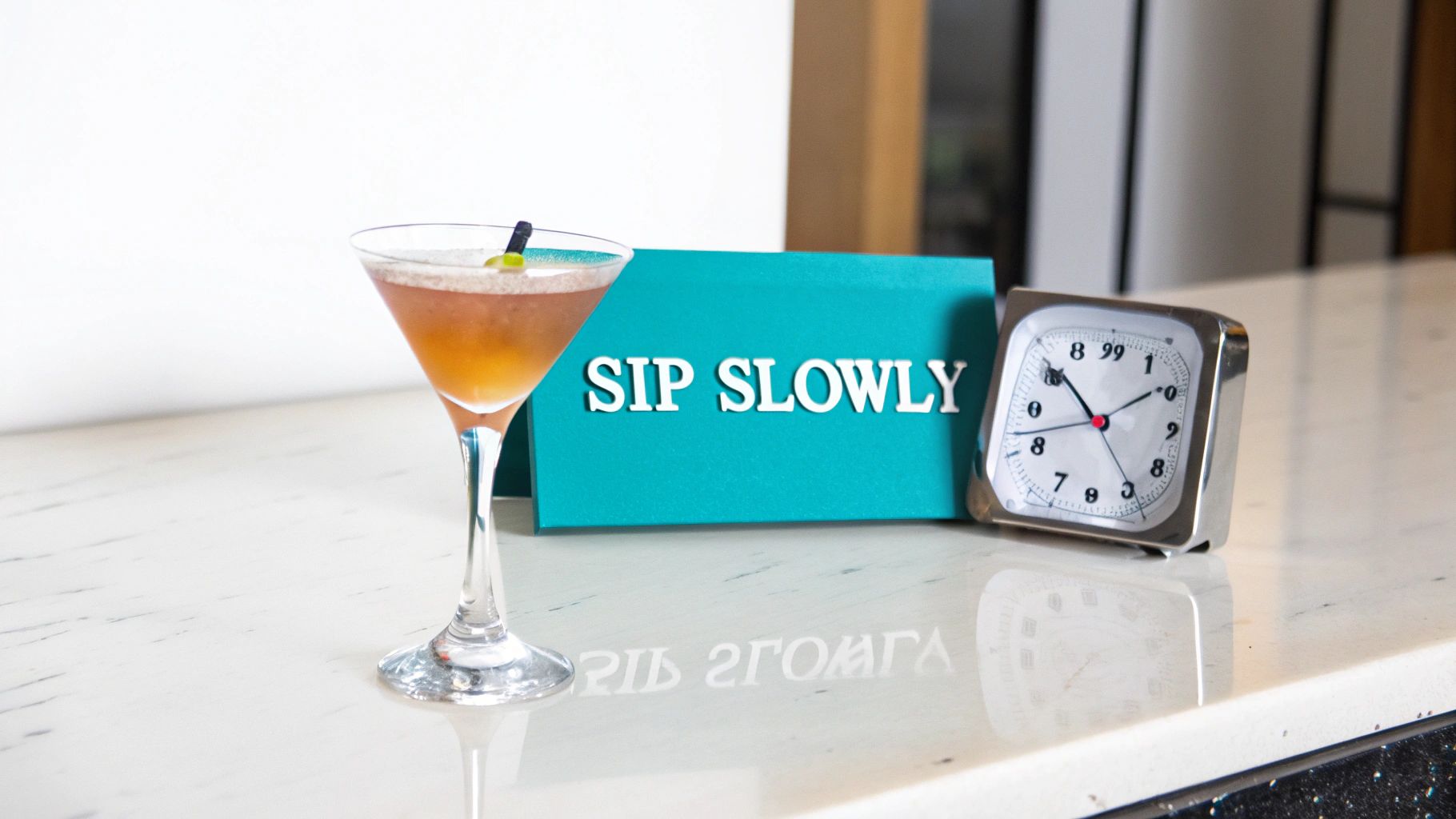
Pacing involves spaced consumption over time and encourages mindful drinking practices, often resulting in reduced overall consumption. This approach limits the peak blood alcohol concentration (BAC), which lessens the strain on your liver. Maintaining a lower BAC also helps you maintain better social awareness and make responsible decisions throughout the night.
This method deserves a place on this list because it’s a proactive and manageable strategy accessible to everyone. The features – spaced consumption, mindful drinking, and reduced overall intake – all contribute to a more positive drinking experience and significantly reduce the likelihood of a hangover. The benefits are clear: a less taxing experience for your body, better social interactions, and a brighter morning after.
While other hangover "remedies" may focus on masking symptoms after the damage is done, pacing addresses the root cause by minimizing the negative effects before they take hold. While some companies may offer quick fixes, they don't prevent the initial harm. Focusing on paced drinking empowers you to take control of your experience.
Examples of Successful Implementation: Many European drinking cultures emphasize slow sipping and savoring the taste rather than rapid consumption. Similarly, Japanese business drinking often involves small cups or glasses that are continually refilled, naturally promoting a slower pace. These cultural examples highlight the effectiveness and social acceptability of paced drinking.
Pros:
- Limits peak blood alcohol concentration
- Reduces strain on your liver
- Often results in lower total consumption
- Maintains better social awareness
Cons:
- Requires self-control in social settings
- May be difficult in fast-paced drinking environments
- Social pressure can undermine efforts
Tips for Pacing Your Drinking:
- Set a drink limit before going out: Pre-planning helps you stay mindful of your consumption.
- Time your drinks with a phone alarm if needed: This provides a concrete reminder to pace yourself.
- Establish a '1 drink per hour' rule: A good general guideline for most people.
- Use the 'sip and savor' technique for spirits: Appreciate the flavors and aromas instead of gulping.
- Choose drinks that take longer to consume: Consider drinks like beer or wine spritzer over shots.
Popularized By: Health organizations like the CDC and WHO, moderate drinking campaigns, and mindful drinking movement advocates all champion the benefits of paced drinking.
By adopting this straightforward technique, you can significantly reduce the risk of a hangover and enjoy a more positive and responsible drinking experience. This proactive approach sets you up for success, allowing you to enjoy the social aspects of drinking without sacrificing your well-being.
5. Take Supplements Before Drinking
Hangovers can derail your day, leaving you feeling drained and unproductive. While moderation is always the best policy, strategic supplementation can be a valuable tool in your hangover prevention arsenal. This approach involves taking specific nutrients before you consume alcohol to support your body's natural detoxification processes and minimize the negative effects of alcohol. This deserves a spot on the hangover prevention tips list because it proactively addresses the biochemical imbalances caused by alcohol, rather than simply reacting to symptoms after the fact. Learn more about Take Supplements Before Drinking
Alcohol depletes essential nutrients and puts a strain on your liver. Taking supplements beforehand can help mitigate this damage. Specifically, a B-vitamin complex can replenish nutrients lost during alcohol metabolism, while anti-inflammatory supplements and liver-supporting herbs like milk thistle can protect against inflammation and cellular damage. Mineral replenishment can also address electrolyte imbalances often contributing to hangover symptoms.
Features and Benefits:
- B-vitamin complex support: Replenishes essential nutrients depleted by alcohol.
- Anti-inflammatory supplements: Reduce inflammation caused by alcohol processing.
- Milk thistle and liver support herbs: Support liver function and detoxification.
- Mineral replenishment: Helps maintain electrolyte balance.
Pros:
- Addresses the root biochemical causes of hangovers.
- Can be taken proactively before drinking.
- Often offers additional health benefits beyond hangover prevention.
- Some supplements have scientific backing for their effectiveness.
Cons:
- Effectiveness can vary between individuals and supplement brands.
- Potential for interactions with other medications (always consult your doctor).
- Not a magic bullet – moderation is still key.
- Quality and dosage consistency can be an issue with some supplements.
Examples and Tips:
- Korean pear juice: Studies have shown this traditional remedy to be effective in reducing hangover severity. Consider drinking it before alcohol consumption.
- Red ginseng: Traditionally used in Asian countries before drinking, red ginseng can be another helpful addition to your pre-drinking routine.
- B-complex vitamins: Take before drinking and potentially again before bed to replenish lost nutrients.
- N-acetyl cysteine (NAC): Consult with your doctor about taking NAC approximately 30 minutes before drinking. It's an antioxidant that supports liver detoxification.
- Milk thistle: Consider incorporating milk thistle into your supplement regimen for ongoing liver support.
- Magnesium: May help alleviate hangover headaches.
Who Popularized This?
Experts like Dr. Andrew Weil, a prominent figure in integrative medicine, along with nutritional biochemists and practitioners of traditional medicine, have brought the benefits of pre-drinking supplementation to light.
Why This Approach Matters for You:
Whether you're a social drinker, nightlife enthusiast, health-conscious individual, busy professional, or frequent traveler, hangovers can disrupt your plans. By taking a proactive approach with supplements, you're empowering yourself to enjoy social occasions without the fear of a debilitating hangover. While other companies might offer general hangover remedies, focusing on pre-drinking supplementation targets the problem at its source. Always remember to prioritize moderation and consult with your doctor before starting any new supplement regimen, especially if you are taking other medications.
6. Stay Active During Drinking Sessions
Staying active during your drinking sessions is a surprisingly effective hangover prevention tip. While it might seem counterintuitive to mix physical activity with alcohol, light movement can significantly impact how your body processes those drinks and ultimately, how you feel the next day. This approach works by boosting your metabolism, enhancing blood circulation, and improving oxygenation, all of which contribute to more efficient alcohol processing. Essentially, you're giving your body a helping hand in dealing with the incoming alcohol. This deserves a spot on this list because it offers a proactive and enjoyable way to mitigate hangover symptoms without sacrificing your social life.
Here's how it works: when you're sedentary while drinking, your body's metabolic rate slows down, potentially leading to a buildup of acetaldehyde, a toxic byproduct of alcohol metabolism and a major contributor to hangovers. Movement, even light activity, counteracts this by increasing your metabolic rate and helping your liver process the alcohol more efficiently. Increased blood circulation further aids this process by transporting oxygen and nutrients throughout your body while carrying away waste products more effectively. Improved oxygenation helps your body function optimally, mitigating the negative effects of alcohol. Plus, staying active naturally paces your drinking. You're less likely to mindlessly sip on a drink when you're engaged in an activity.
Features and Benefits:
- Increased metabolic rate: Aids in quicker alcohol processing.
- Enhanced circulation: Improves oxygen and nutrient delivery, and waste removal.
- Improved oxygenation: Supports optimal bodily function.
- Natural consumption pacing: Reduces mindless drinking and promotes breaks between drinks.
Examples of Successful Implementation:
- Bar games: Playing darts, pool, or shuffleboard provides natural breaks between drinks and encourages movement.
- Dancing: Dance clubs offer a fun way to combine physical activity with social drinking.
- Walking between venues: Opting to walk instead of taking a cab or ride-sharing service adds activity to your night.
Actionable Tips:
- Choose active venues: Look for establishments that offer dancing, games, or other activity options.
- Stand up: When possible, choose to stand rather than sit.
- Take short walks: Even brief walks between drinks or to the restroom can make a difference.
- Engage in social activities: Participate in conversations, mingle, and engage in activities that don't revolve solely around drinking.
- Avoid rapid consumption games: Steer clear of drinking games that encourage excessive and rapid alcohol intake.
Pros:
- May accelerate alcohol metabolism
- Reduces the tendency to drink mindlessly
- Provides natural breaks between drinks
- Social activities create positive alternatives to drinking
Cons:
- Not appropriate for heavy drinking sessions (it's important to know your limits)
- Can mask intoxication levels (pay attention to how you feel)
- May be impractical in certain venues
- Risk of injury if too intoxicated
When and Why to Use This Approach:
This approach is ideal for social drinkers, nightlife enthusiasts, and health-conscious individuals who want to enjoy a night out while minimizing the risk of a hangover. It's particularly beneficial for those who tend to drink mindlessly or find themselves sitting for extended periods during social gatherings. Busy professionals and frequent travelers can also benefit from incorporating these tips into their routines when socializing in new environments. Remember, moderation is key, and this approach is not a license to drink excessively. Staying active can complement responsible drinking habits, but it's not a foolproof method for preventing hangovers if you consume large amounts of alcohol. Listen to your body and prioritize your well-being.
7. Monitor Drink Strength and Count
One of the most effective hangover prevention tips revolves around a simple, yet often overlooked, practice: monitoring your drink strength and count. This means being acutely aware of both the alcohol content (ABV) and the number of drinks you consume. By understanding how much alcohol you're actually ingesting, you can significantly reduce your risk of waking up with a pounding head and regret. This method deserves its place on this list because it empowers you to take control of your alcohol consumption and make informed decisions about your well-being.
How does it work? Standard drink measurements vary significantly depending on the beverage. A 12-ounce beer with 5% ABV contains the same amount of alcohol as a 5-ounce glass of wine with 12% ABV, or a 1.5-ounce shot of a 40% spirit. However, mixed drinks, especially those poured by hand, can be deceptively strong and often contain far more alcohol than a standard drink. This is where mindful monitoring comes in.
Features and Benefits:
- Understanding Standard Drink Measurements: Knowing what constitutes a standard drink is crucial. This knowledge forms the foundation for accurate tracking and responsible consumption.
- Awareness of ABV Variations: ABV percentages can vary widely, even within the same beverage category. Being aware of these variations is essential for making informed choices.
- Tracking Total Alcohol Consumption: Keeping a running tally of your drinks, and considering their ABV, helps you stay within your intended limits.
- Managing Drink Dilution: Opting for "tall" drinks with extra mixer or alternating alcoholic beverages with water can help dilute the alcohol content and pace your consumption.
Pros:
- Provides accurate consumption data for informed decision-making.
- Helps you maintain your intended limits and avoid overdrinking.
- Builds awareness of your personal tolerance level.
- Empowers you to take control of your drinking habits.
Cons:
- Requires vigilance and education about standard drinks and ABV.
- Can be difficult in settings with free-poured drinks, where precise measurements are unknown.
- Social settings may discourage tracking, as it can be perceived as less spontaneous.
- Craft beverages often have higher ABV than expected, making accurate estimation challenging.
Examples and Tips:
- Learn Standard Drink Equivalents: Memorize the basics: 12oz of 5% beer = 5oz of 12% wine = 1.5oz of 40% liquor.
- Ask Bartenders: Don't hesitate to inquire about the ABV of craft beers or mixed drinks. A responsible establishment will be happy to provide this information.
- Use Smartphone Apps: While some apps exist to help track consumption (like 'Drink Control' or 'AlcoDroid'), focusing on mindful drinking and self-monitoring is key. We believe that developing a strong understanding of your limits is more effective than relying solely on external tools.
- Be Wary of Generous Free Pours: In settings where drinks are free-poured, err on the side of caution and assume a higher alcohol content.
- Order Drinks "Tall": Requesting your drink "tall" with extra mixer is a simple way to dilute the alcohol content and slow down your consumption rate.
Why This Matters:
Many European bars prominently display ABV percentages, highlighting a cultural emphasis on responsible drinking. Similarly, public health campaigns and responsible drinking initiatives around the world underscore the importance of understanding and managing alcohol consumption.
This method is particularly beneficial for social drinkers, nightlife enthusiasts, health-conscious individuals, busy professionals, and frequent travelers who often find themselves in situations where alcohol is readily available. By monitoring your drink strength and count, you can enjoy social occasions while minimizing the risk of a hangover and prioritizing your well-being.
7 Key Hangover Prevention Tips Comparison
| Tip | Implementation Complexity 🔄 | Resource Requirements ⚡ | Expected Outcomes 📊 | Ideal Use Cases 💡 | Key Advantages ⭐ |
|---|---|---|---|---|---|
| Hydrate Strategically | Low 🔄 | Minimal ⚡ | Reduces dehydration and hangover symptoms 📊 | Social and casual drinking sessions | Easy, cost-effective, targets dehydration ⭐ |
| Eat Before Drinking | Moderate 🔄 | Moderate (meal prep) ⚡ | Slows alcohol absorption, lowers peak BAC 📊 | Pre-drinking preparation | Nutritional support, reduces intoxication risk ⭐ |
| Choose Alcoholic Beverages Wisely | Low to Moderate 🔄 | Variable (depends on alcohol choice) ⚡ | Less severe hangovers due to fewer congeners 📊 | Selecting drinks at bars or events | Reduces hangover severity, liver-friendly ⭐ |
| Pace Your Drinking | Moderate 🔄 | Minimal ⚡ | Lowers peak blood alcohol levels 📊 | Social drinking with peer pressure | Limits overconsumption, better social control ⭐ |
| Take Supplements Before Drinking | Moderate 🔄 | Moderate (purchase of supplements) ⚡ | Some reduction in hangover severity 📊 | Prophylactic use before planned drinking | Biochemical support, potential health benefits ⭐ |
| Stay Active During Drinking Sessions | Moderate 🔄 | Minimal ⚡ | Accelerates metabolism, reduces mindless drinking 📊 | Venues with physical activity options | Promotes pacing, natural breaks, social engagement ⭐ |
| Monitor Drink Strength and Count | High 🔄 | Minimal to moderate (apps/tools) ⚡ | Prevents unintentional overdrinking 📊 | Situations with varied drink types or craft beverages | Accurate tracking, builds awareness ⭐ |
Embrace the Morning After: Your Journey to Hangover-Free Living Starts Now
This article has equipped you with seven powerful hangover prevention tips: strategic hydration, pre-drinking meals, wise beverage choices, paced consumption, pre-drinking supplements, staying active while drinking, and monitoring drink strength and count. By mastering these strategies, you're not just preventing hangovers; you're investing in a healthier and more vibrant lifestyle. These proactive steps empower you to enjoy social occasions without the dreaded morning after, allowing you to seize the day and perform at your best, whether at work or play. Remember, while some products might offer temporary fixes, true control comes from incorporating sustainable lifestyle changes that minimize alcohol's negative impact. These hangover prevention tips are your foundation for a more enjoyable and productive life.
While a proactive approach to preventing hangovers is always the best strategy, we understand that sometimes you need an extra layer of support. For those occasions, Upside Hangover Sticks can be a valuable addition to your wellness routine. Designed to complement the preventative measures discussed in this article, Upside provides a delicious and convenient way to support your body's natural recovery process after a night out. Ready to take control of your mornings and elevate your well-being? Learn more about how Upside Hangover Sticks can help you bounce back faster and brighter at Upside Hangover Sticks.
